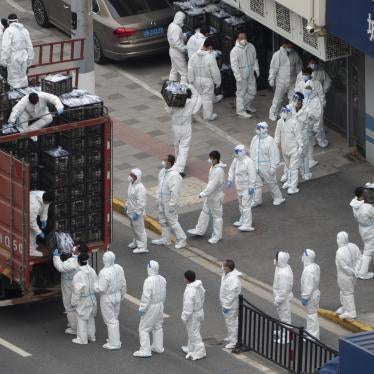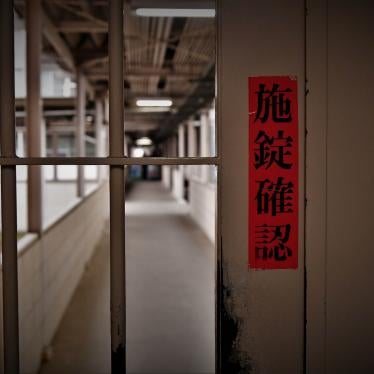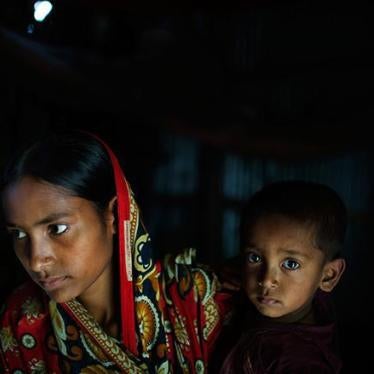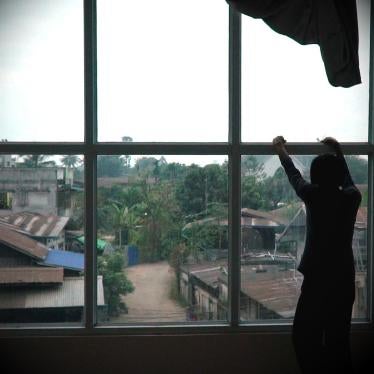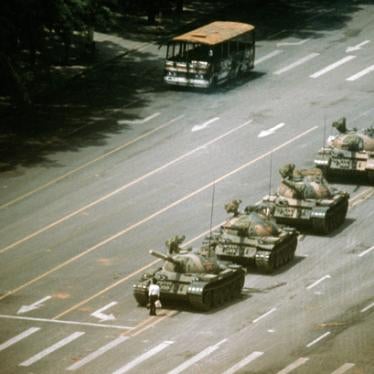(ニューヨーク)-各国政府は、新型コロナウイルス感染症(Covid-19)のパンデミックに関連した人種差別と外国人嫌悪(ゼノフォビア)に基づく暴力や差別の防止に向けた緊急対策を講じるとともに、アジア人やアジアにルーツを持つ人びとへの人種差別に基づく攻撃を訴追すべきだと、ヒューマン・ライツ・ウォッチは本日述べた。2020年5月8日、アントニオ・グテーレス国連事務総長は、「パンデミックによって、憎悪(ヘイト)と外国人嫌悪、スケープゴート探しと恐怖の扇動が大規模に引き起こされ続けている」と述べ、各国政府に対し、「憎悪のウイルスに対する私たちの社会の免疫力を強化するため、ただちに行動してほしい」と訴えた。
ヒューマン・ライツ・ウォッチによると、政府指導者や高官が、反中国レトリックを用いて、直接的または間接的にヘイトクライム(憎悪犯罪)、人種差別、外国人嫌悪を助長しているケースがある。米国、英国、イタリア、スペイン、ギリシャ、フランス、ドイツなどでは、複数の政党や組織が、難民、外国人、有名人、政治指導者を悪魔化する、移民差別や白人至上主義、超国家主義、反ユダヤ主義、外国人嫌悪に基づく陰謀論を浸透させるため、新型コロナウイルス感染症の危機を利用してきた。
「アジア人やアジアにルーツを持つ人びとへの人種差別や物理的な攻撃が、新型コロナウイルス感染症パンデミックによって拡大している。政府指導者はこの傾向に対処するため、断固とした行動をとることが求められている」と、ヒューマン・ライツ・ウォッチのアジア・アドボカシー・ディレクタージョン・シフトンは述べた。「各国政府は、ヘイトクライムを積極的に捜査、起訴すると同時に、一般市民への働きかけを強め、寛容を促し、ヘイトスピーチに対抗していくべきだ」と述べた。
182カ国が批准する人種差別撤廃条約の遵守状況をモニタリングする国連の委員会は、各国政府に「人種差別に対する国内行動計画」を採択するよう勧告している。この計画では、ヘイトクライムの取締強化から寛容を促す住民への訴えかけと教育プログラムに至る、人種差別および差別と対決する具体的なアプローチの配置が求められている。各国政府は、新型コロナウイルス感染症による人種差別と外国人嫌悪の大きな動きに対処する、新たな行動計画の策定に向けて直ちに行動する必要があると、ヒューマン・ライツ・ウォッチは指摘する。
パンデミックの発生以来、アジア人やアジアにルーツを持つ人びとが、報道や政治家の発言、ソーシャルメディアでの軽蔑的な物言いの標的となる一方、新型コロナウイルス感染症に関連したヘイトスピーチもかなり拡大していると見られる。ドナルド・トランプ米大統領が「中国ウイルス」と言い、マイク・ポンペオ国務長官が「武漢ウイルス」と言ったことは、米国でのヘイトスピーチを後押しした可能性がある。トランプ大統領は3月下旬にはこの表現を控え、「わが国のアジア系アメリカ人コミュニティ」を支持するとツイートしたが、アジア人やアジアにルーツを持つ人びとの保護のための政府の具体的な対応を指示してはいない。
早い段階でパンデミックの中心となったイタリア・ヴェネト州の知事は2月に報道陣に対し、イタリアは中国よりウイルス対応をうまくやってのけるだろうと述べ、その理由として、イタリア人は「衛生面への注意という点で文化的に強いものがあり、手を洗ったり、シャワーを浴びたりしているが、誰でも見たことがあるように、中国人はネズミを生きたまま食べるのだ」と発言した。知事は後に謝罪した。ブラジルの教育相は中国人を嘲笑するツイートを行い、パンデミックが中国政府の「世界征服計画」の一部だと示唆した。
人種差別的なレトリックの増加は、人種差別的な攻撃の増加と一致している。2月以降、世界中のアジア人やアジアにルーツを持つ人びとが、パンデミックにかかわりがあると思われる攻撃や殴打、暴力的ないじめ、脅迫、人種差別的な虐待、差別にさらされている。
イタリアでは、2月から民間団体「ルナリア」が、アジアにルーツを持つ人びとへの暴行、言葉による嫌がらせ、いじめ、差別に関する報告や報道を50件以上集めている。フランス、オーストラリア、ロシアの人権団体などもヒューマン・ライツ・ウォッチに対し、アジアにルーツを持つ人びとに対する新型コロナウイルス感染症関連の攻撃や嫌がらせがあると述べている。
イギリスでは、アジア人が顔を殴られたり、嘲笑されたり、コロナウイルスをまき散らしていると非難されたりしている。オーストラリアでは、女性2人が複数の中国人留学生を襲撃し、1人を殴る蹴るし、「中国に帰れ」「クソ移民ども」と罵る事件があった。スペインでは、男性2人が中国系アメリカ人男性1人を襲撃した。殴打により、被害者は2日間昏睡状態となった。テキサス州では、ナイフを持った男性によるビルマ人家族の襲撃事件があった。
アフリカでは、ケニア、エチオピア、南アフリカなどで、アジア人や外国人全般に対して、コロナウイルスを持ち込んでいるとする差別や攻撃が報告されている。ブラジルでは、アジアにルーツを持つ人びとへの嫌がらせや排除が報道されている。
政府によっては、その影響も考えず、外国人労働者だけを対象とする厳格なロックダウンを課し、多くの労働者が生き延びるのに必要な十分な医療、財政支援、その他のサービスを提供していないケースもある。5月上旬、マレーシア政府当局は大規模な取締りを行って難民や移民労働者を拘束し、移民コミュニティやロヒンギャ難民が新型コロナウイルス感染症の拡散に関与しているからだと、何の根拠も示さずに主張した。
中東全域では、外国人労働者に対する根強い人種差別的なレトリックが公の場で根強いが、人口密度の高い外国人労働者(大半がアジア人)向け隔離地域で新型コロナウイルス感染症が何度か発生した後、さらに強まった。
差別はアジア人やアジアにルーツを持つ人びとに留まらないと、ヒューマン・ライツ・ウォッチは指摘した。インドやスリランカでは、ここ数年、政治指導者が高まるムスリム差別をほぼ放置してきたが、ムスリムに対する新型コロナウイルス感染症関連と思われる攻撃や差別事例が多く報告されている。ミャンマーでは、ウルトラ民族主義者が、パンデミックをだしにしてムスリムへの脅迫やヘイトスピーチを正当化している。
中国の広州では、アフリカ人への人種差別事件が増えている。広州当局は、アフリカ人やアフリカにルーツを持つ人びとを強制隔離したり、物件所有者に対し、アパートやホテルから退去させるよう要求したりしている。
「人種差別を何度も公の場で非難することは、政府によるコロナウイルス対策の大切な一部だ」と、前出のシフトンディレクターは述べた。「また政府には、特別な公的教育プログラムを作成し、ヘイトクライムの取締りを強化し、差別や人種差別に基づく攻撃の被害にあったコミュニティを支援することも求められている。ソーシャルメディア企業には、ヘイトスピーチや外国人嫌悪のコンテンツの拡散を防止または抑制するために、オンライン空間をしっかりとモニタリングすることが求められている。」
Country-Specific Cases
United States
Anti-Asian incidents have continued in the US since the outbreak of the Covid-19 pandemic, with numerous media reports in February and March about attacks and discrimination linked to Covid-19. By late April, a coalition of Asian-American groups that had created a reporting center called STOP AAPI HATE said it had received almost 1,500 reports of incidents of racism, hate speech, discrimination, and physical attacks against Asians and Asian-Americans.
In one typical incident, a Chinese-American reported “I was on the phone with my mom speaking in Mandarin when a woman walked by and yelled ‘get this corona virus chink away from me,’ directed at me.”
At least 125 of the incidents reported were physical attacks. Among the reported incidents: “A truck drove by and threw a [fast food franchise] drink on my back and yelled ‘Hey chink, you’re fucking nasty.’” In another, an Asian-American waiting for a bus said a man:
began berating me. I ignored him … [then] an object of substantial weight was thrown at me with high velocity – missing me but impacting the side of the bus with a sickening ‘thwack.’ Instantly, I sobered to an awareness in the amount of trauma the object would have caused if it had struck my head.
The group also reported hundreds of cases in which Asian-Americans were harassed in public or barred from businesses or transportation, yelled at in supermarkets, accused of “bringing coronavirus” to the US, or refused transport in car services like Uber or Lyft.
On May 4, the Anti-Defamation League released a list of near-daily incidents of racist attacks and cases of harassment from January through early May. For instance, on May 3, a stranger shouted at an Asian man on the New York subway “You’re infected China boy, you need to get off the train” and then attempted to pull the man out of his seat.
From March through early May, there were numerous public reports of violent physical attacks on Asian Americans including in California, Minnesota, New York, and Texas. NextShark, a website focused on Asian-American news, only received a few messages per day before the pandemic about cases involving anti-Asian bias; now it receives dozens.
Senior members of several Asian-American and other nongovernmental organizations have told Human Rights Watch that many members of the Asian-American community they work with have experienced abuse or harassment, or know someone who has.
The Federal Bureau of Investigation (FBI) and other federal agencies have not taken any specific actions to address the rise in racist attacks and discrimination, although several state and local governments have set up hotlines and directed authorities to investigate cases of attacks or discrimination.
United Kingdom
Several violent attacks against people of Asian descent were reported when the Covid-19 outbreak began in the UK in February, including several physical attacks or beatings.
In early May, Sky News reported that data it had obtained through Freedom of Information requests to various regional UK police forces showed at least 267 anti-Asian hate crimes recorded across the country between January and March. In many jurisdictions, the figures for the first three months of 2020 were higher than all of 2018 or 2019. The figures from the British Transport Police between January and March, for instance, showed anti-Asian (or “anti-Chinese”) hate crime incidents matching the total number of complaints during all of 2019.
Stop Hate UK, an anti-racism group, reported in March that it had received increasing numbers of calls or reports of “racism, discrimination, and verbal abuse, arising from perceptions that they are members of the Chinese community.”
The senior-most UK police official responsible for hate crime nationally has stated publicly that police forces are monitoring anti-Asian hate crime and take such crimes seriously. In a recent release of crime statistics generally during the Covid-19 outbreak, however, police authorities focused on crime decreasing generally, without noting the rise in anti-Asian hate crime or indicating steps they are taking to stop it.
Several of the country’s local police forces did not provide information to the Sky News Freedom of Information requests about Covid-19-related hate crimes. This raises concerns about whether they are collecting data on anti-Asian hate crimes and whether they are monitoring and disaggregating hate crime by ethnicity, despite clear official guidance to do so.
Russia
On about February 20, after Russia banned Chinese citizens from entering the country, the state-owned transport company Mosgortrans began ordering drivers of public transport in Moscow to report Chinese passengers to the police. Staff stopped many passengers perceived to be Asian and asked for identification and the number of their metro pass to track their movements. The Chinese embassy sent a letter to the Moscow government on February 24 asking them to take steps to stop the discriminatory practice. During the last week of February, well before Moscow was placed under lockdown, police raided several locations to identify Chinese citizens and force them into quarantine, regardless of their travel histories.
The Russian group SOVA, which monitors xenophobia and racism, told Human Rights Watch that there had been increased attacks against Asians since February. It also reported a “wave of insulting and racist commentary directed at Chinese people and natives of Central Asia on social media” in relation to Covid-19.
A media report by Lenta on March 29 detailed several accounts, including cases of people yelling at Asians or Central Asians on the subway or in public, asserting that “the Chinese brought coronavirus to this country.” Through March, there were also reported incidents of discriminatory actions against Asian-looking people in Nizhnevartovsk, Ekaterinburg, Tatarstan, and Makhachkala, among other places.
Australia
A spate of cases of racist abuse and attacks and vandalism against people of Asian descent have been reported across the country since the outbreak of Covid-19. For example, there were reports in late March in Sydney of cases in which “Death to dog eaters” was painted in front of an Asian man’s house and of people screaming racist abuse at two sisters, calling them “Asian dogs” who “brought Coronavirus here” and “dumb whore.”
Near Melbourne, also in late March, a Chinese-Australian family’s suburban home was targeted with racist vandalism three times in the space of a week: on March 20, the family found the words “COVID-19 China die” spray painted on the door of their garage. Late the following night, an unidentified person threw a large rock though one of their windows. On March 29, the door of their garage was again spray painted, this time with the words “leave and die.”
On April 15, 2 women in a group attacked 2 female Chinese students at Melbourne University, yelling racist statements such as, “Go back to China” and “you fucking immigrants.” One of the women repeatedly punched one of the students in the head and, after pushing her to the ground, kicked her in the torso several times.
A survey focusing on Covid-19-related racism against Asians and Asian-Australians recorded 178 incidents during the first two weeks of April countrywide. The survey, by the community group Asian Australian Alliance, has received about 12 reports a day since April 2, ranging from racial slurs to physical assault. The majority of racist incidents reported – 62 percent – were against women. Australia’s Human Rights Commission also reported a spike in complaints about racist attacks. The Australian National University created a “prejudice census” to better collect information about the surge of incidents linked to Covid-19.
Prime Minister Scott Morrison has criticized Covid-19-related racist attacks, telling Australians to simply “stop it.” Alan Tudge, Australia’s acting minister for immigration and multicultural affairs, also strongly condemned the rise in racist attacks, and a Labor parliament member, Andrew Giles, and other opposition leaders have called for the government to restart a national anti-racism campaign.
India
Hate speech against Muslims, already a serious and growing problem since the election of the Hindu nationalist Bharatiya Janata Party (BJP) in 2015, increased in connection with the spread of Covid-19.
In April, social media and WhatsApp groups were flooded by calls for social and economic boycotts of Muslims, including by BJP supporters. Several physical attacks on Muslims have also occurred, including of volunteers distributing relief material, amid falsehoods accusing them of spreading the virus deliberately.
Hate speech against Muslims appears to have grown after Indian authorities announced that a large number of Muslims had tested positive for Covid-19 after attending a mass religious congregation in Delhi, organized by the international Islamic missionary movement Tablighi Jamaat. BJP officials fanned the flames by calling the Jamaat meeting a “Talibani crime” and “CoronaTerrorism.” Some mainstream media supportive of the BJP have used terms like #CoronaJihad, causing the hashtag to go viral on social media.
The situation grew so serious that the World Health Organization (WHO) issued a statement of caution, noting that “it is very important that we do not profile the cases on the basis of racial, religious, and ethnic lines.”
Prime Minister Narendra Modi has not explicitly condemned hate speech against Muslims, but tweeted “COVID19 does not see race, religion, colour, caste, creed, language, or borders before striking. Our response and conduct thereafter should attach primacy to unity and brotherhood. We are in this together.” But Indian authorities at the national and local level have not taken adequate steps to stem the increasingly toxic atmosphere or conduct adequate investigations of attacks where appropriate.
Sri Lanka
Several government officials have made stigmatizing public comments about Sri Lanka’s minority Muslim community in the context of the pandemic, as hate speech has been reported across the country. This includes claims that Muslims are responsible for deliberately spreading the pandemic, along with calls for boycotts of Muslim businesses. Muslim organizations wrote to the government on April 12 to draw attention to an increase in hate speech in Sri Lanka.
The Sri Lankan government issued a rule on March 27 that anyone who dies from Covid-19 complications must be cremated, which is at odds with Islam religious practice. The WHO has said that cremation should be “a matter of cultural choice and available resources,” and is not necessary to prevent the spread of Covid-19. Four UN special rapporteurs issued a communication on April 8 finding that the rule was a violation of freedom of religion and also drawing attention to anti-Muslim hate speech and the stigmatization of Muslims who had tested positive for Covid-19. A Muslim man, Ramzy Razeek, who wrote against the cremation rule on Facebook, received death threats. When he complained to the police, he was arrested on April 9.
International Legal Obligations
The International Convention on the Elimination of All Forms of Racial Discrimination obligates countries to “condemn racial discrimination” and undertake measures aimed at “eliminating racial discrimination in all its forms and promoting understanding among all races” while undertaking “not to sponsor, defend, or support racial discrimination by any persons or organizations.” Countries need to “prohibit and bring to an end, by all appropriate means ... racial discrimination by any persons, group, or organization” and “discourage anything which tends to strengthen racial division.”
The Committee on the Elimination of Racial Discrimination (CERD), set up to monitor the treaty’s provisions, has stated in a general recommendation on combating racist hate speech that “[f]ormal rejection of hate speech by high-level public officials and condemnation of the hateful ideas expressed play an important role in promoting a culture of tolerance and respect.” The CERD committee recommends that governments undertake “information campaigns and educational policies calling attention to the harms produced by racist hate speech,” and that training for police and legal systems is “essential” to foster “familiarization with international norms protecting freedom of opinion and expression and norms protecting against racist hate speech.”
Given the upsurge in anti-Asian and other racism and xenophobia related to the Covid-19 pandemic, all governments should adopt new action plans to address emerging forms of discrimination and xenophobia tailored to the new and changing circumstances, Human Rights Watch said. The UN High Commissioner for Human Rights outlined best strategies for adopting action plans in a set of guidelines released in 2014.
